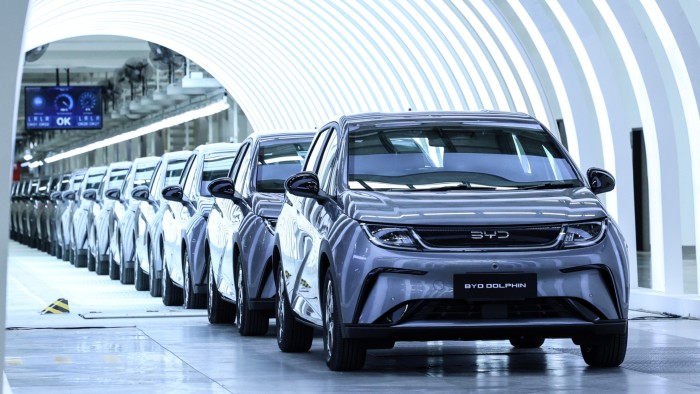Stay informed with free updates
Simply sign up to the Chinese trade myFT Digest — delivered directly to your inbox.
The writer is a fellow on the Chinese economy at the Asia Society Policy Institute
The EU’s decision to demand technology transfers from Chinese companies in exchange for battery production subsidies is a bold idea with many detractors. Critics, both in Europe and abroad, warn of economic coercion, retaliation by Beijing and the risks of deepening China’s market influence in Europe.
But these concerns miss the point. The policy is neither capitulation nor gamble; it is a calculated response to the realities of the global competitive landscape for electric vehicles.
The EU’s requirements will align Chinese and European interests in ways that could redefine green ambitions. It is a strategy that the US, stuck in its obsession with tariffs and decoupling, should emulate.
By tying subsidies to technology transfers and local production requirements, Brussels ensures that Chinese companies contribute to the EU’s industrial base rather than merely exporting batteries. This approach mirrors other global trade practices. The US Inflation Reduction Act, for example, ties clean energy subsidies to domestic content.
The EU’s policy leverages the strength of China’s leadership in battery technology and production. Chinese industry insiders view it as an opportunity to deepen integration into European markets. By transferring technology and establishing local production, Chinese battery companies can secure access to critical resources in a region less prone to geopolitical tensions than the US.
Tariffs, by contrast, have done little to achieve their intended goals. They lead to workarounds, provoke retaliation and disrupt supply chains without addressing underlying industrial challenges. Europe is focusing on strategic inclusion rather than exclusion, fostering mutual benefits.
European EV makers need Chinese batteries. Look at the problems faced by Northvolt, Europe’s homegrown battery champion. Despite billions in funding and high-profile contracts, the Swedish company has struggled to scale up, facing operational hurdles and cost overruns. It has now filed for bankruptcy. Chinese companies, by contrast, dominate not just battery production but the entire ecosystem — cathodes, anodes, electrolytes and logistics. Europe will struggle to replicate these capabilities.
The EU’s tech transfer policy addresses this gap and will develop a resilient, domestically anchored Chinese battery industry. It also minimises the growing pains that come with starting from scratch. And it will position Europe to navigate a fraught global trade environment.
This strategy should also avoid internal EU divisions. Spain partners with Chinese companies on EVs, while France leans towards protectionism. The tech transfer policy aligns national and collective interests, creating a framework to share benefits equitably.
The US should take note. Its reliance on tariffs and the rhetoric of decoupling is more about posturing than progress. Restricting imports from China in the hope that domestic industries will flourish has not delivered. Instead, tariffs disrupt supply chains, drive up consumer costs and spur Chinese companies to adapt. Suppliers reroute exports through third countries, expand into alternative markets and continue innovating faster than their western counterparts.
Rather than shutting China out, the US should engage more strategically. Decoupling risks pushing China and Europe closer together. Beijing is already courting Brussels as a counterweight to US protectionism. Policies such as the EU’s tech transfer requirements deepen these ties.
The US does not need to abandon its concerns about China but it should rethink its approach. By adopting a version of the EU’s policy and tying market access to technology transfers and local production, America could ensure Chinese companies contribute to its growth while mitigating overreliance on imports.
Shifting the narrative around trade and industrial policy is crucial. Tariffs are politically expedient but economically flawed. A strategy combining engagement with strategic safeguards might be more difficult to explain to the public but it will be far more effective in practice.
Neither the US nor Europe can afford to fall behind in the green technology race. The stakes are immense and the competition is unrelenting. By embracing a pragmatic framework, the west can position itself as an active architect of the clean-energy future.
Pragmatism is not weakness. Deals signal serious intent to secure a place in the green economy and ensure that Beijing does not have the final word.
Source link









